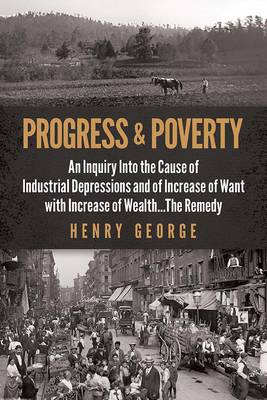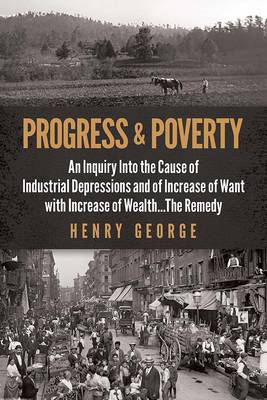
- Afhalen na 1 uur in een winkel met voorraad
- Gratis thuislevering in België vanaf € 30
- Ruim aanbod met 7 miljoen producten
- Afhalen na 1 uur in een winkel met voorraad
- Gratis thuislevering in België vanaf € 30
- Ruim aanbod met 7 miljoen producten
Zoeken
Progress and Poverty
An Inquiry Into the Cause of Industrial Depressions and of Increase of Want with Increase of Wealth . . . the Remedy
Henry George
Paperback | Engels
€ 41,45
+ 82 punten
Uitvoering
Omschrijving
Progress and Poverty offers a fundamental inquiry into the cause of industrial depressions and the persistence of poverty and advancing wealth. Upon its 1879 debut, it quickly became the bestselling book on economics and was a principal inspiration for the United States' Progressive Era of the 1890s through the 1920s. It also influenced major public and political figures such as Albert Einstein, Winston Churchill, and Sun Yat-sen.
Henry George proposed a "single tax" that would assess the value of land--not buildings or other enhancements, just the land itself. He maintained that society as a whole would share in the benefits: wages could be raised, the use of land improved, and there would be no need to tax productive activity. Land speculation would be discouraged, and development would be promoted. In elaborating upon these ideas, George addressed many economic subjects, such as tariffs and trade, currency, interest, capital, economic cycles, and other social issues.
Henry George proposed a "single tax" that would assess the value of land--not buildings or other enhancements, just the land itself. He maintained that society as a whole would share in the benefits: wages could be raised, the use of land improved, and there would be no need to tax productive activity. Land speculation would be discouraged, and development would be promoted. In elaborating upon these ideas, George addressed many economic subjects, such as tariffs and trade, currency, interest, capital, economic cycles, and other social issues.
Specificaties
Betrokkenen
- Auteur(s):
- Uitgeverij:
Inhoud
- Aantal bladzijden:
- 624
- Taal:
- Engels
Eigenschappen
- Productcode (EAN):
- 9780486842080
- Verschijningsdatum:
- 15/07/2020
- Uitvoering:
- Paperback
- Formaat:
- Trade paperback (VS)
- Afmetingen:
- 137 mm x 213 mm
- Gewicht:
- 771 g

Alleen bij Standaard Boekhandel
+ 82 punten op je klantenkaart van Standaard Boekhandel
Beoordelingen
We publiceren alleen reviews die voldoen aan de voorwaarden voor reviews. Bekijk onze voorwaarden voor reviews.







